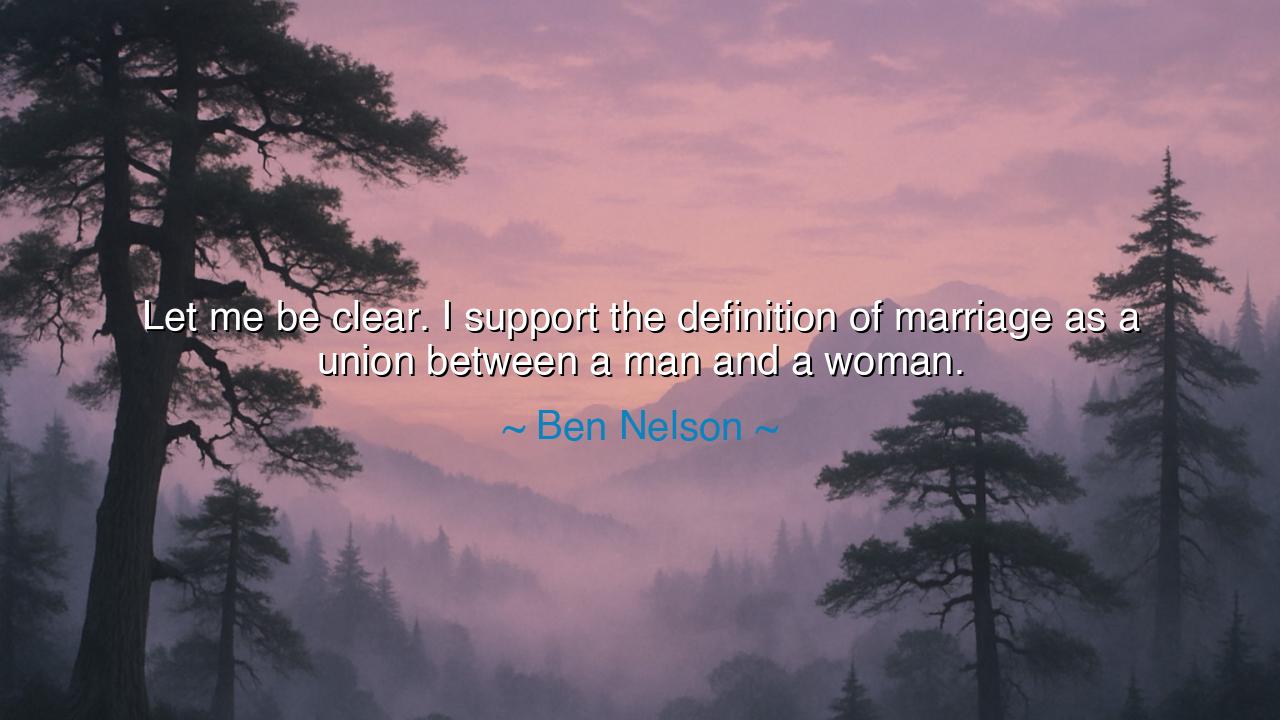
Let me be clear. I support the definition of marriage as a union
Let me be clear. I support the definition of marriage as a union between a man and a woman.






In the words of Ben Nelson, a man of conviction and tradition, we hear a voice from an era caught in the storm between heritage and change: “Let me be clear. I support the definition of marriage as a union between a man and a woman.” This declaration, though simple in its phrasing, speaks to a deep and ancient struggle—the clash between what has long been held sacred and the winds of a new world rising to challenge it. To understand these words, we must look not only to their surface, but to the trembling roots beneath them, where faith, fear, and the longing for stability all intertwine.
Since the dawn of civilization, marriage has stood as a pillar of human order. The ancients saw it not merely as the joining of two hearts, but as the foundation upon which families, tribes, and nations were built. In the temples of Mesopotamia, in the laws of Hammurabi, and in the scriptures of countless peoples, the union between man and woman was enshrined as both divine and practical—a balance between the masculine and the feminine, the seed and the soil, the hunter and the hearth. To alter that vision was to question not only custom, but the cosmic rhythm by which life itself seemed to unfold.
Yet history is the tale of humanity’s endless redefinition of itself. In every age, new voices rise to ask: must the old laws forever bind the living? Nelson’s words come from a time when marriage equality was still contested—a time when many feared that expanding the meaning of marriage would unravel the moral tapestry of the nation. His statement, “Let me be clear,” carries the weight of finality, of a man drawing a line in the sand. And yet, beneath that firmness lies a deeper human truth: the longing to preserve what feels eternal in a world that refuses to stand still.
Consider the story of King Henry VIII of England. His defiance of the Church’s definition of marriage—seeking divorce and remarriage—shook the religious and political order of an empire. What began as a personal conviction became a revolution that changed the course of faith itself. History teaches us that when people challenge or defend the definition of marriage, they are not merely debating law—they are wrestling with the very identity of their age. Henry’s act, though born of pride, revealed how sacred and volatile the institution truly is: it is the mirror of every generation’s moral soul.
In defending traditional marriage, Nelson stood among countless others who believed they were guardians of an ancient order. To them, the union of man and woman was not an exclusion, but a pattern laid down by nature and divinity. They saw in it the mystery of creation—the union that gives life, that carries lineage, that reflects the dual forces of the world. Yet time, with its unrelenting tide, demands that every tradition prove its endurance. For even the most sacred customs must one day face the question: is this truth eternal, or merely ancient?
The rise of the movement for marriage equality in the years that followed revealed a different kind of courage—the courage to expand the circle of love, to see beyond the form to the essence. Those who stood on both sides of the debate shared one thing: passion born of belief. Some feared that redefining marriage would fracture the moral spine of civilization; others saw its expansion as the next step in humanity’s awakening to compassion. Both sides spoke from the heart, and in that, both touched the divine, for truth is often found not in victory, but in the struggle itself.
The lesson, then, is not to condemn nor to glorify, but to understand. Every age must face its crossroads, and every soul must decide where it stands. To some, marriage remains the sacred joining of man and woman; to others, it is the sacred joining of souls, regardless of gender. But in all, the commandment is the same: to love deeply, to honor sincerely, and to build faithfully. The form may change, but the essence endures—the yearning of one heart to find another and say, “We are one.”
So let those who inherit this world walk with wisdom. Defend what is sacred, but listen to what is true. Speak your convictions with strength, but never with cruelty. For in the end, whether we cling to tradition or embrace change, it is love, not law, that redeems us. And when love is guided by humility, even the fiercest debates of humankind can become the forge of deeper understanding—and the dawn of a more compassionate age.






AAdministratorAdministrator
Welcome, honored guests. Please leave a comment, we will respond soon